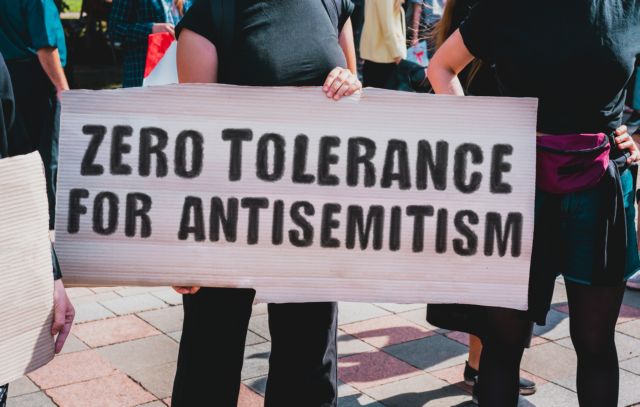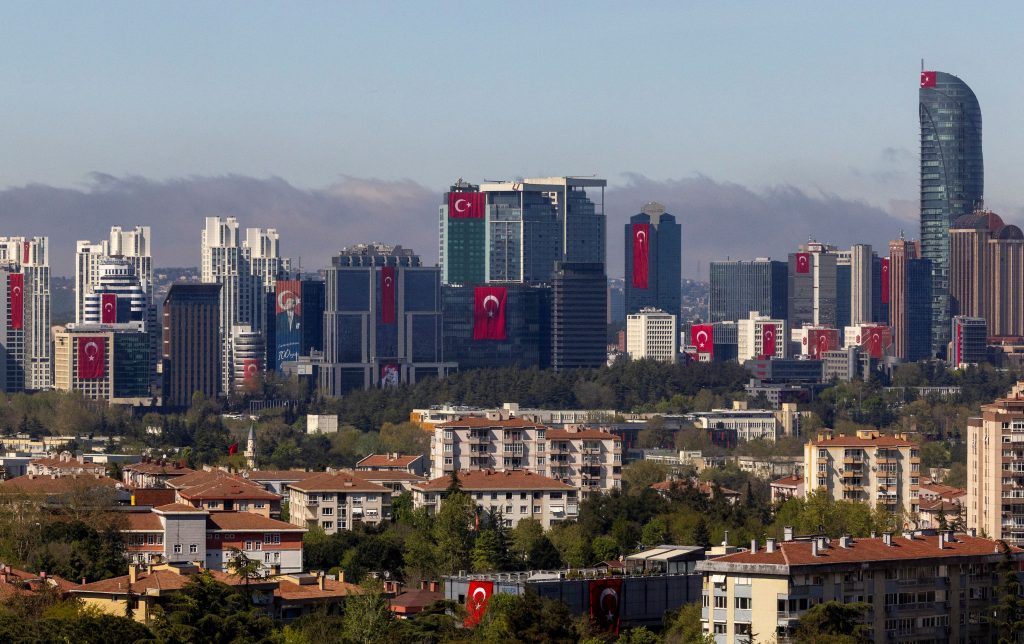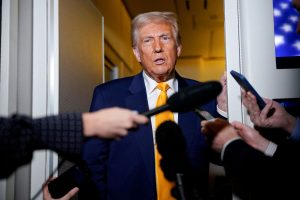TikTok is facing what it views as perhaps its biggest crisis yet, with the world’s most popular app facing an intense backlash over the perception it favors pro-Palestinian and, at times, antisemitic content.
Citing anti-Israel posts that surfaced on TikTok since the Gaza conflict began and a decades-old Osama bin Laden letter that circulated this week, Washington lawmakers have renewed calls to ban the app in the U.S.
TikTok executives view this ban attempt more seriously than previous ones, according to people inside the company, and have rushed to respond to what they view as an inaccurate and unfair narrative.
Top executives set up meetings with Jewish leaders and celebrities to tell them they take their concerns seriously. They published a post that argues it has been fair in moderating pro-Israel and pro-Palestine videos. When a venture capitalist tweeted that his independent research had found TikTok favors pro-Palestinian content—and said he is convinced it explains why more young people are opposing Israel—TikTok Chief Executive Shou Zi Chew personally called him to argue the point.
These efforts haven’t yet stalled the narrative. Nikki Haley, rising in the polls in the Republican presidential primary race, said Friday that the appearance of the bin Laden letter on TikTok is justification for banning the app. And lawmakers say the anti-Israel and bin Laden videos should spur new legislative efforts.
All social-media platforms have been flooded with disinformation, gory content and propaganda since the conflict broke out in early October and have struggled to enforce their respective policies against such posts. But TikTok, where a sizable percentage of young people now get their news, has received the most scrutiny.
This crisis is testing TikTok’s Washington-based lobbying operation—which has spent $7.4 million so far this year, on pace to double the amount from last year—and its chief communications officer, Zenia Mucha, a high-profile recent hire who once held the same role at Disney. And it presents the biggest challenge to date for Chew, who endured a hostile Congressional hearing in March.
TikTok is unlike other social-media platforms because it is owned by a Chinese parent company, ByteDance, and thus vulnerable to shifting political winds.
Lawmakers from both parties, as well as some Biden administration officials, say the Chinese government could order TikTok to spy on its 150 million American users or to spread propaganda. TikTok says it would never comply with such an order—and that it is in the process of siloing off its U.S. operations from China with a $1.5 billion plan.
TikTok executives don’t know whether the company, which is unprofitable, can survive in the rest of the world if banned in the U.S. It depends on the big American market for ad sales and is banking on a budding U.S. e-commerce business as a new revenue stream. Chew said in an interview earlier this year that the U.S. also provides another unique asset: internet celebrities considered cool around the globe because they represent modern Americana.
Bipartisan momentum to ban TikTok was high immediately after Chew’s congressional hearing. But it petered out, congressional aides say, in partbecause lawmakers got distracted by more attention-grabbing issues.
Then Hamas, the militant group that controls the Palestinian territory of Gaza, attacked Israel on Oct. 7, sparking war.
TikTok responded by creating a virtual “command center,” with Arabic and Hebrew moderators in Singapore, Ireland and the U.S., monitoring war-related content 24 hours a day, according to people familiar with the matter.
It got feedback from its Middle East Safety Advisory Council, a group of seven academics and other experts. The members flagged questionable videos in an active group chat with their TikTok liaison, and the company was responsive in removing them, two council members said in interviews. But TikTok hasn’t been perfect.
“They may be overwhelmed,” said Naila Hamdy, a council member and journalism professor at the American University in Cairo, in an interview two weeks after the war started. “There is stuff on there that, if I were a moderator, I would remove altogether.”
Behind the scenes, TikTok moderators struggled to balance censoring antisemitic and anti-Muslim content, according to people familiar with the matter. In the early days of the war, they focused on removing antisemitic videos and comments, the people said.
Then, when TikTok started noticing more celebrities supporting Palestinians, the company became more concerned about anti-Palestinian and anti-Muslim content, the people said. Moderators shifted their focus to remove those videos and comments.
The effect was to seesaw back and forth as TikTok’s leaders tried to impose human moderation, on top of its normal automated processes, in order to react to what videos are popular at any given moment.
“If you aren’t actively seeking balance, things can get out of whack pretty fast,” said one person who was involved in the efforts.
In a statement, a TikTok spokeswoman said: “There is no balancing to be done—we remove hate speech, period, and it’s not dependent on the day of the week.”
On Oct. 26, a California venture capitalist named Jeff Morris Jr. wrote posts on X, formerly known as Twitter, that said TikTok was being controlled by a combination of bots, or automated software, and people paid to promote anti-Israel views by Hamas-supporting organizations. He also said TikTok had far more pro-Palestine hashtags, or phrases, compared with pro-Israel ones.
His posts have garnered about 10 million views. Chew, TikTok’s chief, was so alarmed that he called Morris and said that his analysis was flawed, according to people familiar with the matter. Chew failed to get Morris to recant his posts.
Morris didn’t respond to requests for comment.
The problem escalated when politicians began saying that TikTok was promoting pro-Palestinian content to turn American young people against Israel. In early November, Rep. Mike Gallagher (R., Wis.), chairman of the House committee on China, wrote an essay for an online publication calling TikTok “digital fentanyl.” He said it is “brainwashing our youth” by promoting anti-Israel content. The op-ed was widely shared by other conservatives.
Days later, Sen. Josh Hawley (R., Mo.) wrote a letter to Treasury Secretary Janet Yellen, renewing his calls for a Treasury Department-led panel on foreign investment to ban the app in the U.S. Hawley cited “the ubiquity of anti-Israel content on TikTok, where most young internet users get their information about the world.”
At a GOP presidential debate in Miami last week, a number of candidates echoed the calls to ban TikTok. Former New Jersey Gov. Chris Christie charged that TikTok was “polluting the minds of American young people” with “antisemitic, horrible stuff.”
“This is China trying to further divide the United States of America,” he said.
TikTok eventually rebutted the concerns this past Monday. In a blog post on its website, TikTok said comparing hashtags is a flawed way of determining whether a platform is biased, and that rival platforms have similar ratios of pro-Palestine versus pro-Israel content. It also pointed out that support for Israel has declined over time for younger people, and younger people are more likely to use TikTok.
TikTok thought it was turning the page. Then a new problem arose this week: a proliferation of posts in which users cited bin Laden’s 2002 “Letter to America,” an antisemitic document in which he justified the Sept. 11 attacks.
Politicians including Haley and Gallagher cited that as the latest reason to ban TikTok.
In a statement, TikTok said that content promoting the letter violates its policies and that it has taken steps to squelch its spread. It said it counted 274 videos with the hashtag #lettertoamerica, and that those videos had been viewed a total of 1.85 million times, which is low compared with popular hashtags with several hundred million views. Posts with the hashtag #gymtok, for example, had more than 200 million views over the same period.
TikTok has set up meetings with leaders of the Jewish community in the U.S., including one on Sunday between Chew and former Rep. Ted Deutch (D., Fla.), who is now CEO of the American Jewish Committee, an advocacy group.
On Wednesday, two top executives held a video call with a group of Jewish celebrities including chef Eitan Bernath and comedians Amy Schumer and Sacha Baron Cohen. The group had written an open letter to the company, saying it didn’t have enough safeguards to protect the Jewish community from digital and physical danger.
“I appreciated TikTok’s leadership coming to the table for this crucial conversation,” Bernath said in a statement. “We all love TikTok and are eager to hear what leadership commits to doing to ensure TikTok is a safe place for Jewish creators and the Jewish community at large.”



